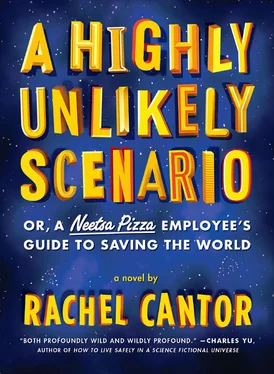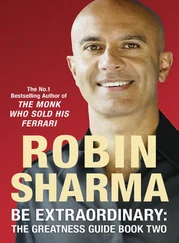Leonard nodded, straining now to see what might have been an island connected to the banks by bridges on either side.
I wonder where they find the fish, he said, as he saw no fish catchers.
When Sally didn’t reply, Leonard said, It’s interesting here, don’t you think? Don’t you find yourself wondering about this place, its Custom and Commerce, for example? How do the people earn their lucre? What do they eat?
We know what they eat and it’s disgusting — and no, I’m not interested to know more. I want to find Felix and get out of here.
Leonard suddenly felt very, very tired.
Don’t worry, Sally said. He’ll be fine. You trust Isaac, right? He won’t let anything happen to him.
No, Leonard said, stepping out of the way of a man and donkey pulling a creaking wooden cart, its bed filled with sloping sacks of something heavy. They made their way back to the bridge, walking around the four nuns who toddled arm in arm and a blind man who was led by a clubfooted boy. Small groups of pilgrims continued to enter the bridge from every direction, separated by nationality; collectively they surged toward the basilica — funereal Hungarians, Egyptians singing in a low tone. Like a disorganized version of one of the Leader’s Birthday Happiness processionals: every group represented, united by hope and joy. All along the bridge, Romans hawked beaded wristlets, tin pilgrims’ badges, and disturbing miniature crutches, shackles, and limbs. Instinctively, Leonard and Sally attached themselves to the largest group — ten Portuguese wearing brown pilgrims’ gear that more or less resembled theirs — and followed them across the river, where they had their choice of streets to the basilica and chose the busiest.
This must be the Business District, Sally whispered, for indeed, the buildings lining the road were crammed with workshops, stands, and booths, some sheltered by vaulted brick arcades, some jutting into and obstructing the road. They sold many wonders; some even sold lucre — but for what purpose? What manner of strange place this was! In addition to the badges and miniature shackles they’d seen earlier, they now saw books for sale, and straw, and tiny vials of oil — too small for ritual wedding-night anointing (at which thought Leonard blushed) — as well as the more familiar fruit, vegetables, spices, and fish.
Should we talk with the fisherpeople? Sally asked, looking back over her shoulder at a smiling seller of eel.
I think we should wait till morning, Leonard said — and they arrived at a small irregular square, behind which was the basilica, the largest building Leonard had ever seen, larger even than the University Library, though really it seemed a random agglomeration of connected buildings, towers, and outbuildings. Leonard couldn’t help but approve of the five flights of seven stairs at the end of the square leading to the main building, five being the quintessence, Pythagoras’s marriage number, the indivisible combination of masculine three and feminine two, seven being the virgin prime number, indivisible, with no product within the decad.
As they crossed the square toward the stairs, old men pulled at Leonard’s tunic, offering to set broken bones or extract teeth or mend torn-up shoes. Others hawked miniature body parts, blocking their way and pushing wax noses and wooden elbows into their faces. One happy Frisian nearly knocked Sally to the ground after purchasing a model of an ox. Unwashed people, many of them infirm, threw themselves immoderately at their feet, seeming to want coins in exchange for no service whatsoever. Young men swarmed about them, each claiming to be an official guide. Trade jewelry? Trade coins? I get you maximum indulgence! What you speak? German? Frank? Castilian?
Sally and Leonard moved quickly up the steps and elbowed their way through a three-arched structure into a rectangular courtyard surrounded by arcades — it had to be almost a third of a furlong in each direction. Around the sides of the courtyard, ten paintings of large, serene-looking people — the heads of Rome’s fast-food joints, perhaps, though Leonard hadn’t seen anything like a restaurant yet, apart from Bobolo’s hostellery. Through the throng, Leonard could discern — which is to say, he could hear and, eventually, see — two fountains of exquisite beauty. Fantastic birds and sea creatures spouted water into the first from a bronze dome, held aloft by eight red columns (eight, no doubt, because every odd number after one yields a multiple of 8+1 when squared). The second fountain featured a marble bath adorned with lambs, and mysterious symbols ingeniously fashioned out of broken bits of colored stone. Leonard had seen nothing like them, and wished to push away, or at least reprimand, the insolent unwashed who used them to bathe their hands and feet.
Across the courtyard, past the second fountain, was the basilica itself, finally. Hundreds of pilgrims streamed in and out of its five doors, each entryway apparently reserved for some subset of visitor, though there were no pictographs to guide them. Leonard and Sally had nearly walked through a door reserved for Romans, before being pushed away by an angry old man, then one reserved for pilgrims accompanied by their guides. When they finally crammed their way through the correct door, the middle door, which seemed to be made entirely of silver, they felt they had escaped something.
A dark corner where you can think
Once inside, they retreated to a dark corner where they could think. Not that any corner of that brilliantly lit basilica was dark, or quiet enough for thinking. But in the corner at least they ran less risk of being trampled by pilgrims rushing from one extremity of the building to another.
Is this what you expected? Sally asked.
WHAT? Leonard asked.
IS THIS WHAT YOU EXPECTED? Sally asked.
Leonard hadn’t expected anything, and certainly not this. Double aisles flanked each side of an enormous central hall, each aisle marked by columns as tall as any building in the Business District back home. And the length of it — at least one-tenth of a verst! The ceiling was timbered and painted, and along each wall were placed innumerable alcoves, each lit by lamps and decorated with golden objects and paintings of yet more enormous men and women, all, it seemed, wearing what appeared to be gowns. Each of the alcoves was mobbed by pilgrims who clustered and clamored, each trying to touch or kiss the golden objects, or crying out and swooning to the ground. Others held torches and scurried from alcove to alcove. There was no order to their frantic peregrinations as they zigzagged across the aisles, circumventing or, more often, bumping into clumps of pilgrims who picnicked on fish and vegetables or sang songs, accompanied by stringed instruments. This chaos disturbed Leonard perhaps even more than the church’s awesome scale and strangeness.
Sally moved closer so they might converse without shouting — so close, in fact, that their tunics touched. Leonard remembered the day before, more than seven hundred years in the future, when Sally’s orange-skin gown, in contact with his leg, shimmered like electricity.
He scooched that final inch closer; she didn’t seem to mind.
How many people do you think are here? Sally asked, pulling out the last of their provisions: two bridies and two dried ham stix.
A lakh?
Half a lakh, anyway, Sally said, munching on a bridie. The crowd seemed to make her smaller.
I love you, Leonard reminded her, dividing his dried ham stix into five pieces so it might last longer.
I don’t like it here, she said in a small voice.
It’s not so bad, he said, passing Sally one of the pieces of his dried ham stix. It’s like an adventure. Shall we walk around?
I don’t want to, Sally said.
Читать дальше












